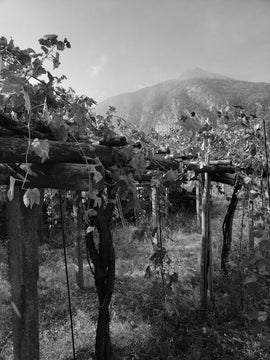Happy Earth Day! Now, more than ever, it is important to take whatever steps we can to protect whatever of the environment we can. With its focus on differences in vintage and the finicky nature of growing grapes, the wine industry is often a canary in the coal mine for climate change. This frequently leads to vineyards and wineries working with people within both the scientific and agricultural fields towards finding solutions to mitigate the effects of rising temperatures, chaotic weather patterns, and more extreme seasons, which affect not only the fruits and grains we grow for our favorite beverages, but the staple crops that keep people fed.
Farming practices in Europe and the United States after World War 2 were filled with chemical pesticides, fertilizers, and antifungals that for a while made disease and pest control much easier. After years of use, the long-term effects on both people and the soil were shown to have harsh side effects, destroying the health of the soil and increasing cancer among people. Over the last few decades, this has exploded into a range of different certifications, farming practices, and winemaking styles. Whole books and research papers have been dedicated to this subject, so we will give you a quick round-up of what you will see most of mentioned on your bottles.
Organic - Grapes grown without synthetic fertilizers and in a way that protects the environment and preserves the soil: use of cover crops; minimal to no tilling of the soil; reduced water consumption; strict rules regarding fungicides, insecticides, and chemicals used for maintenance and upkeep with a list of allowed and prohibited substances. Wine can also be made organically, which involves only organically certified materials being used during the winemaking process, including no added sulfur (naturally occurring sulfur is permitted).
Biodynamic - The next step beyond organic farming is based on the ideology of Rudolph Steiner, a trained scientist and philosopher who believed in a ‘spiritual science' and being a steward of the land. Biodynamics views the entire farm as a living organism and puts a premium on biodiversity. Naturally occurring cycles like moon phases dictate when to harvest, and special concoctions of herbs, minerals and manure may also be planted in the soil to aid fertilization. Only non-GMO seeds are allowed and animals on these farms must be free-range and pasture-fed. Demeter certification for biodynamic farming is one of the few recognized worldwide and one of the hardest to receive, with the US only having 67 wineries with a combined 1584 hectares, around 3914 acres, of land so certified.
Regenerative Organic - Similar to Biodynamic in taking organic practices to the next level. These farming principles are focused on conservation, rehabilitating the soil, and reintroducing beneficial native insects. While not as formalized as biodynamic farming, it shares the same goals and a lot of the same practices. Organizations involved with regenerative farming include the Noble Research Institute and the Rodale Institute.
Sustainable - Sustainability includes not just the environmental concerns of organic farming, but also takes into consideration the community aspect and usually involves projects involving alternative energy, greenhouse gas emissions, and making sure farmworkers have access to insurance and further education. There are a multitude of these certifications focusing on different issues. The two biggest for California are SIP (Sustainability in Practice) and the California Sustainable Winegrowing Alliance, both of which focus not only on organic farming techniques, but also competitive wages and training for farmworkers.
To honor Earth Day, we present a selection of organic and sustainable wines for you to enjoy as you reflect on ways YOU can contribute to a healthier planet.
Cheers!
Justin Malesheetz (Your Just In Case Curator)
|
Fieldhand Garden Avenue Red Blend -Made with Organic Grapes |
|
|
Sonoma, CA USA |
About the winery: Fieldhand is the passion project of Patrick O’Brien who has been working around Napa and Sonoma at such wineries as Failla and O’Brien Estate. He helps people convert their backyard vineyards to organic farming, and in lieu of payment, he takes the fruit to create these wines. In the vineyard he uses no sprays, preferring to use pruning and cover crops to protect the vine health. In the winery he uses ambient yeast, no new oak, and minimal sulfur to create fresh low-alcohol wines. About the winemaking: Composed of 60% Gamay Noir and 40% Pinot Noir from Baytree Lane Vineyard in the foothills of the Sonoma Valley bordering the Petaluma Gap. Hand-harvested and co-fermented with ambient yeast and 100% whole-cluster to preserve a bright fruit character, give a spicy herbaceousness, and provide tannic structure and balanced acidity. Aged for 5 months in neutral oak and stainless steel. Bottled unfined and unfiltered. Tasting Notes: Bright red cherry, incense, and raspberry on the nose with a mineral character. Bright acidity with soft tannins and a finish bursting with notes of fresh red berries. |
|
Winemaker: Patrick O’Brien |
|
|
$28.99 per bottle |
|
|
Suggested Food Pairing: Cojita cheese, Spinach strawberry salad, Fish curry, Seared tuna |
|
organic
|
Baileyana Edna Valley Pinot Noir - Sustainable Vineyards |
|
|
Edna Valley, CA USA |
About the winery: Started in 1990, Baileyana is located in Edna Valley, one of the coolest AVAs in CA, just 5 miles from the Pacific Ocean. Founded by Jack and Catherine Niven who put Edna Valley on the map, with Jack being one of the architects of the region receiving its own AVA. Baileyana works with Sustainability In Practice Certified sustainable vineyards. About the winemaking: Pinot Noir is macerated on the skins for 14-15 days to give color and tannin to the wine and then aged for 9 months in French oak, 30-40% of which is new. Tasting Notes: Opulent and lush, with a nose of vanilla, cherry cola, and dark berries. Full bodied with velvety tannins and notes of wild strawberry, black cherry, white and white cocoa with a long, rich finish. |
|
Winemaker: Rob Takigawa |
|
|
$19.99 per bottle |
|
|
Suggested Food Pairing: Pork roast, Ham, Roasted root vegetables |
|
|
Chateau Anthonic Les Aigles D'Anthonic Moulis-en-Medoc - Certified Organic in 2019 |
|
|
Moulis-en-Medoc, Bordeaux FR |
About the winery: While this estate has been around since the mid 19th century under various names, the Cordonnier family took over in 1977 when Pierre Cordonnie purchased the estate from the Hugon family, who had been the previous owners for decades. He was succeeded by Jean-Paul in 1993, who had studied agro-engineering in Belgium with a focus on water and forests. He slowly removed the use of insecticides and chemicals, but believed it was not enough. He started integrating agroforestry practices, planting trees in the vineyard to help increase biodiversity and soil health. As of 2019, they are certified organic and source lightweight glass for their bottles to further lower their carbon footprint. About the winemaking: 100% Merlot from certified organic vineyards with vines at an average age of 20 years which undergo a 17-day maceration to create a softer wine. 50% of this wine is aged in terracotta amphorae and 50% is fermented in a large French oak for two years. Tasting Notes: Juicy red fruit and mint on the nose. Light and fruity with soft tannins and notes of red plum with a fresh easy finish. |
|
Winemaker: Eric Boissenot |
|
|
$23.99 per bottle |
|
|
Suggested Food Pairing: Beef stew, Cheese souffle, Roast pork, Vegetarian Lasagna |
|
|
Camp North Coast Cabernet Sauvignon- Made with Organic Grapes and organic winemaking |
|
|
Santa Rosa, CA USA |
About the winery: Camp was started in 2011 by the Hobo Wine Co. to showcase the quality of Sonoma County wine. Both are the brainchild of Kenny Likitprakong, a Sonoma County native and UC Davis alum who grew up around wine as his father was the General Manager at Domaine St. George. They focus on making approachable and affordable wines from responsibly farmed vineyards and without commercial additives or yeast in their winemaking. About the winemaking: A blend of Cabernet Sauvignon from the Lolonis Vineyard in Redwood Valley, Martorana Vineyard in Dry Creek Valley, Shamwary and Prior Vineyards in Sonoma Valley, and Merlot from the Gibson Vineyard in Hopland and the Morrison Vineyard in Sonoma Valley. All of these vineyards are certified organic by California Certified Organic Farmers. All lots were fermented in stainless steel with ambient yeast and with a minimum of 1-2 punchdowns or pumpovers per day to extract color, tannins, and aromatic compounds. Aged in neutral French oak barrels. Tasting Notes: Earthy nose with notes of cassis, blackberry, mint, and forest floor. Medium-bodied with grippy tannins and balanced acidity with flavors of fresh blackberry and blueberry with a long, juicy finish. |
|
Winemaker: Kenny Likitprakong |
|
|
$18.99 per bottle |
|
|
Suggested Food Pairing: Pork rillette, Beef carpaccio, Smashburgers |
|
|
Peterson Winery Zero Manipulation Red Blend- Sustainable Farming |
|
|
Redwood Valley, Mendocino CA USA |
About the winery: Fred Peterson arrived in Dry Creek Valley in 1983 from Mount Eden Vineyards in the Santa Cruz Mountains to develop vineyards, selecting the ideal varieties and sites, including his own property on Bradford Mountain. In 1987, he started Peterson Winery with a focus on sustainable farming and an old world winemaking philosophy. In 2002, his son Jamie took over as Assistant Winemaker. After two vintages in Australia and New Zealand, he came back to Sonoma, taking winemaking classes at Santa Rosa Junior College and UC Davis while working at the winery, learning on the job. About the winemaking: 62% old-vine Carignan planted in 1933, 31% Grenache, and 7% Syrah all farmed sustainably from Tollini Vineyard in Redwood Valley. Aged for 21 months in neutral oak and bottled unfined and unfiltered. Tasting Notes: Rich nose with notes of black cherry, cranberry, fresh herbs, and baking cocoa on the nose. Full bodied with big but well integrated tannins and balanced acidity. Juicy black cherry, coffee, and more cocoa on the palate and a plush finish. |
|
Winemaker: Jamie Peterson |
|
|
$17.99 per bottle |
|
|
Suggested Food Pairing: beef wellington, pork roast, turkey with stuffing |
|
|
Ricca Terra Bullets Before Cannonballs Red Blend - Certified Sustainable |
|
|
Riverland, South Australia AU |
About the winery: Ashley Ratcliff had put in time working at wineries in the Barossa Valley for years and was looking for a place of his own. Ashley and Holly Ratcliff purchased their first vineyard in 2003 with the goal of growing grape varieties that best suited the warm and dry climate of the Riverland region of South Australia. Over time, this led them to shift from varietals like Chardonnay and Merlot to more Mediterranean varietals as climate change began affecting the region. They have won numerous awards, including Viticulturist of the Year by the Australian Society of Viticulture and Oenology and Gourmet Traveler WINE. They are dedicated to sustainability and practice organic farming whenever possible, utilizing lighter glass, fertilizing with cow manure instead of commercial fertilizers, and planting cover crops to increase organic material in the soil and suppress weeds. About the winemaking: 38% Tempranillo, 16% Shiraz, 15% Lagrein, 14% Lambrusco, 9% Petite Sirah, and 8% Aglianico. Each variety is fermented separately in stainless steel and entirely destemmed. Fermentation is carried out naturally over a period of 7-20 days. The wine is basket-pressed to third use French tonneau and barriques for aging. Secondary fermentation was carried out naturally throughout the spring and after 12 months of aging the wine was blended. Bottled without fining or filtration. Tasting Notes: Crimson, with a nose of cocoa, black pepper, plum, and black cherry. Full bodied with grippy tannins and fresh acidity with lots of raspberry and dark cherry on the palate with an earthy finish. |
|
Winemaker: Ashley Ratcliff |
|
|
$19.99 per bottle |
|
|
Suggested Food Pairing: Roasted eggplant, cochinita pibil, carnitas |
|
|
Craggy Range Te Muna Sauvignon Blanc - Sustainable Winegrowing New Zealand member |
|
|
Malborough, NZ |
About the winery: Craggy Range was founded in 1998 by Mary and Terry Peabody with the help of Master of Wine Steve Smith in Hawke’s Bay and Martinborough on the North Island of New Zealand. They have focused on sustainability and have undertaken the largest biodiversity program in the New Zealand wine industry, planting over 150,000 native trees and plants around the Te Muna Roads vineyard. About the winemaking: 100% Sauvignon Blanc is partially hand-harvested from the estate-owned Te Muna Road Vineyard. 85% of the grapes are destemmed before fermentation in stainless-steel tanks and oak barriques using partial wild yeasts. The wine is aged on fine lees for 3 months in a combination of stainless steel tanks and French oak puncheon before being fined, filtered and bottled. Tasting Notes: Tropical nose bursting with kiwi, pineapple, and guava. Mouthwatering and medium bodied with a long citrusy finish with flavors of lime and candied orange peel. |
|
Winemaker: Ben Tombs |
|
|
$24.99 per bottle |
|
|
Suggested Food Pairing: Mussels, lobster roll, garlic crab, dim sum |
|
|
Naveran Brut Nature Cava - Made with Organic Grapes |
|
|
Alt Penedes, Catalonia, ES |
About the winery: Founded in 1985 by Swiss-born Michel Gilleron Parellada, a graduate in Enology from the École d’Ingénieurs de Changins in Switzerland. The land of Caves Naverán has been in Michel's family since the 19th century and is farmed organically. About the winemaking: 20% Macabeo, 20% Parellada, 40% Xarel-lo and 20% Chardonnay. Each grape variety is harvested, crushed and fermented separately in stainless steel tanks at low temperature. Tirage and second fermentation occurs in the bottle for a minimum of two years without dosage. The wine is aged for at least 12 months on its lees. Tasting Notes: Floral and citrusy on the nose with a fine mousse. Bone dry on the palate with notes of green apple and meyer lemon with a mineral finish |
|
Winemaker: Emili Esteve |
|
|
$20.99 per bottle |
|
|
Suggested Food Pairing: Fresh fruit, oysters, fried chicken, brie |
|
|
En Cavale Who Goes There? White Blend - Organically Farmed Vineyards |
|
|
Contra Costa, CA USA |
About the winery: En Cavale was started in 2017 as a collaboration between Chad Westbrook Hinds of Iruai Wines and Wolfgang Weber, focusing on organically farmed vineyards throughout the corners and pockets of Northern California, made with minimal intervention and priced accessibly. About the winemaking: A blend of Sauvignon Blanc, Verdelho, Albariño, and Fiano, all fermented on their skins for about three to four weeks. Sauvignon Blanc is all from Contra Costa County, and aside from about 4 weeks of skin contact during fermentation, it sees elevage in acacia barrels (new - 6 years old). Verdelho goes into used french oak after 3-4 weeks on the skins; Albarino and Fiano were co-fermented and pressed off into tank (plastic) after 3-4 weeks on the skins. Blended and settled in tank and neutral French barrel for a few weeks. Tasting Notes: Pale gold with a savory perfumed nose jumping out of the glass with notes of fresh rosemary, thyme, bay leaf, grilled pineapple, and lemon peel. Light bodied, bright, and juicy with notes of tropical fruit, orange marmalade, and elderflower on the palate with a floral finish. |
|
Winemaker: Chad Westbrook and Wolfgang Weber |
|
|
$25.99 per bottle |
|
|
Suggested Food Pairing: Hard salty cheeses, sardines, Greek salad with chicken |
|
|
Allimant-Laugner Gentil - Certified Organic in 2023 |
|
|
Alsace, FR |
About the winery: With over 10 generations of farming grapes, Allimant-Laugner started making their own wine with Charles Allimant working with his daughter Mariette and her husband Rene Laugner in 1949. In 1984, their son Hubert took over. They just finished converting to organic, with the 2023 vintage being their first certified, but had been farming sustainably for years before. About the winemaking: 45% Riesling, 35% Muscat, and 20% Pinot Gris from 15 year-old vines planted to granite and limestone soils. Fermented with natural yeasts in stainless steel tanks. Tasting Notes: Floral and citrusy on the nose, this is dry and on the lighter side of medium body with bright acidity and flavors of lychee, nectarine, and lemon. |
|
Winemakers: Hubert Laugner |
|
|
$19.99 per bottle |
|
|
Suggested Food Pairing: ceviche, asparagus, fruit tarts |
|
|
Gundlach Bundschu Dry Gewurztraminer - Certified Sustainable/Regenerative Organic Certified® |
|
|
Sonoma, CA USA |
About the winery: With a storied history going back to 1858, Gundlach Bundschu is California's oldest continuously run family-owned winery. They have been pioneers in viticulture for over a century, being some of the first people in Sonoma to experiment with grafting native rootstock during the phyloxera outbreak of the 1870s. They have been certified sustainable since 2008, started converting the vineyard to certified organic in 2019, and in 2023 fully converted to certified regenerative farming. About the winemaking: 100% Gewurtztraminer from certified regenerative organic vines planted in 1969 and 2008. Pressed whole cluster and aged in stainless steel and 10% in neutral oak. Tasting Notes: Aromatic and spicy with a nose of potpourri, citrus, and tamarind. Medium bodied with a balanced acidity and long tropical finish with notes of pineapple, guava, and papaya. |
|
Winemaker: Joe Uhr |
|
|
$24.99 per bottle |
|
|
Suggested Food Pairing: Salmon poke, agua chile, green thai curry, quiche |
|
|
Sylvain Faudot Arbois Saint Antoine Sustainable Farming |
|
|
Arbois, Jura FR |
About the winery: Started in 1998 when Sylvain Faudot acquired two vineyards totalling 15 acres. He farms lutte raisonnée, which translates to "the reason struggle". This is an approach to viticulture which tries to minimize the application of agrochemicals so that they are used only when absolutely necessary and not as a matter of routine. About the winemaking: 50% Savagnin (an aromatic grape native to the Jura, related to Traminer and Gewurztraminer) and 50% Chardonnay. The Savagnin is aged 3 years in oak barrels and allowed "la flore", a layer of yeast that develops when the wine barrel is not fully topped up and comes into contact with oxygen. The Chardonnay is also aged 3 years in oak barrels, but with ouillage (topping up the barrel to avoid oxidation) to give roundness. Tasting Notes: Salty and nutty nose with notes of lime salt, dried apple, ginger, and walnut. Vibrant acidity with nuttiness on the start of the palate giving way to lemon, lime, and green apple with a long savory finish. |
|
Winemaker: Sylvain Faudot |
|
|
$24.99 per bottle |
|
|
Suggested Food Pairing: Comte, Roast chicken, Asparagus risotto, Chicken with morel mushrooms |
|




